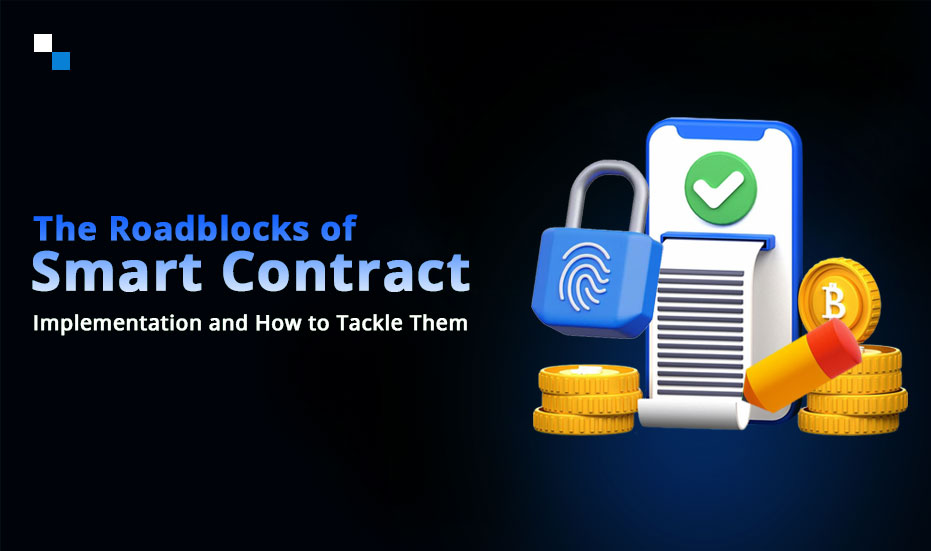
Top 10 FAQs about White Label Crypto Exchange Software Development
May 19, 2023
A New Era of Travel: End-to-End Experience Redefined with NFTs
May 19, 2023Blockchain is the new revolution in the real estate market and smart contracts are one of the main drivers of this trend. According to a report, the largest asset class, real estate by value, is expected to grow from $2687.35 billion in 2020 to $3717.03 billion in 2025 with the disruption of Blockchain technology in the sector. The technology not only allows the user to digitize their assets as tokens but also enables smart contract development specialists to deploy their logics for automating real estate transactions and enhancing security and transparency.
Real estate businesses today are interested in riding the wave and reaping the related benefits. If you’re curious to see how this pacing technology is disrupting the real estate market, walk through the blog. Below, we have covered the challenges of the current real estate industry and how Blockchain can help the industry overcome them. We have also tried to gather the most popular real estate companies, proving that smart contracts are not only for FinTech but for real estate too.
Challenges with Current Real Estate Industry
The following are the challenges the existing real estate industry faces. These challenges decline the overall buying and selling experience for both parties, buyers and sellers.
- Lots of Intermediaries
Buying and selling property can be hectic, especially when multiple parties are involved, including buyers, sellers, agents, realtors, notaries, and other intermediaries. Multiple patient involvements can result in a lack of trust and lead to delays, disputes, and increased costs.
- Lengthy and Costly Processes
The traditional real estate transactions are based on extensive paperwork which makes the process time-consuming as one has to walk through several tasks such as title searches, contract review, etc. Not only this, but intermediaries also charge commissions which somehow raises the cost.
- Fraud and Security Risks
Real estate transactions are also prone to fraud and security risks, including identity theft, forged documents, and manipulation of funds. It is one of the major challenges the existing real estate industry faces.
- Lack of Accessibility
Traditional real estate transactions can be restricted by geographical boundaries, which makes it difficult for international buyers and sellers to participate in the process. The barriers can also be caused by more factors such as financial constraints and discriminatory practices.
- Low Liquidity
Liquidity is one of the significant challenges in the real estate market. Unlike other investment assets, such as bonds or stocks, real estate has low liquidity due to several reasons, such as market entry barriers, complicated outreach, high-transaction costs, lengthy sale process, market conditions, etc.
Smart Contracts- Reshaping the Future of Real Estate Transactions
Real estate is one of the business niches soaking up smart contracts and empowering businesses in the best possible ways. Smart contracts are self-executing smart contracts stored on the Blockchain that execute automatically when predetermined conditions are met.
Smart contracts have the potential to transform the way real estate transactions are conducted. This is why it is gaining traction in the real estate industry. As more real estate companies and platforms adopt smart contract development, we can expect to see continued growth in this area.
Ready to design your own smart contract for real estate?
Schedule Free DemoHow Smart Contract Disruption Transforming the Real Estate Landscape
The following shows how smart contract disruption in real estate is transforming the whole way of conducting real estate transactions-
1. No Intermediaries
Blockchain and smart contract development are widely popular for their capability of eliminating the need for many people in the process. Smart contracts enable the automatic execution of tasks, such as ownership transfer, ownership verification, payments, mortgage approval, and more that helps save time and reduce costs.
2. Better Security
Blockchain provides security in terms of data protection. People having access in the network can see the information. The cryptographic mechanisms of the smart contract ensure the data is stored in an encrypted format that hackers can’t harm.
3. Reduces Costs
When there are no intermediaries or central authority to charge additional fees and commissions, the cost of service will be reduced. McKinsey report shows the blockchain could help businesses save $50 billion in business-to-business transactions.
4. Increased Transparency
Smart contracts feature the terms parties agree on in advance. When these terms are met, tasks are automatically executed. Once the smart contracts are implemented and executed, they can’t be changed or manipulated by anyone due to the immutability feature offered by Blockchain. An unalterable contract adds to transparency and builds trust.
5. Improved Accessibility
Smart contract development has the potential to enhance accessibility in the real estate industry in several ways. With fractional ownership and cross-border real estate transactions, smart contracts can improve accessibility at some level.
6. Increased Liquidity
Smart contracts can boost real estate liquidity by streamlining transactions, automating processes, and enabling fractional ownership and tokenization. In addition to this, global accessibility offered by smart contracts also expands the pool of potential buyers and sellers, which further increases liquidity.
Real Estate Player Already Leveraging Smart Contracts
Here’s how different types of companies are adopting the smart contracts to reap several benefits-
- Rent Peacefully
Rent Peacefully is another leading real estate player that uses Ethereum-based smart contracts to validate rental lease arrangements. Such a system can handle payment deposits, maintenance requests, and arbitration.
- SMARTRealty
Founded in 2017, SMARTRealty is a real estate leader that utilizes the power of smart contracts for peer-to-peer transactions in the American real estate market.
- Mata Capital
Mata Capital is a well-established European investment management brand that partnered with an Ethereum software provider in 2020 to wrap up a deal that has a great influence on the global real estate sector & tokenize EUR 350 million worth of assets.
- Meridio
Meridio (now Consensys) is another New York-based real estate company that is perfect for fractional ownership. Meridio sells investors a share of real estate property for as low as $1,000 by real estate asset tokenization.
- PropertyClub
PropertyClub was started in 2018. The company uses the blockchain for secure, tokenized transactions in the city. With over 10,000 listings, the platform assists with marketing and refined housing searches. A variety of cryptocurrencies like Bitcoin are used for consumer convenience.
Conclusion
Although smart contract development offers promising solutions to these challenges, it is important to note that the widespread adoption of this Blockchain-powered solution is still in its early stages. Several legal, and technical considerations need to be considered before it turns into a standard practice. As technology evolves, smart contracts can revolutionize the real estate industry in several terms, efficiency, security, and transparency.
If you want to be one of the leading real estate market players leveraging smart contracts, connect with Antier. We offer comprehensive smart contract development services with Blockchain development team support that can create custom smart contracts for various use cases, ensuring they meet your specific business requirements.



